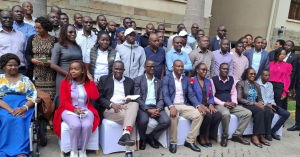Kenya is among three East African countries engaged in strengthening agricultural knowledge and the innovation ecosystem for inclusive rural transformation and livelihoods in Eastern Africa (AIRTEA) Project.
The AIRTEA project was conceived to contribute to the attainment of sustainable farming livelihoods and rural transformation by fostering an inclusive innovation environment in Kenya, Uganda, and Rwanda.
Speaking about the project during a digital agriculture platform awareness workshop for innovation platform members in Kenya, Programme Officer for Agricultural Technology and Innovation at the Association for Strengthening Agricultural Research in Eastern and Central Africa (ASARECA), one of the implementing partners, Joshua Okonya, said they were working on different value chains that include avocado, dairy, maize, extension, and fish.

“We are using the innovation platform model among the agriculture value chains by bringing different actors right from the producers, distributors, transporters, the processors, and consumers whose biggest problem has been market,” he said.
Okonya said that they are linking the producers with markets using the digital models where one could just log in and find information one needs.
“There is power in the use of digital tools, and we want to talk about, leverage on, and enhance utilisation of the tools even in the agriculture sector,” he said.
The Programme Officer noted that oftentimes, countries are struggling without enough extension service providers, and therefore digital tools could help in training farmers, building their capacity, and not only linking them to the markets but also improving their knowledge in good agricultural practices, control of pests and diseases, and even access to financial institutions.
Within the project, Okonya said they have developed different digital apps, and the meeting was aimed at creating awareness among the different stakeholders so that players could start utilising them.

“We want to see the impact on the ground as we have the relevant research and innovation from the 11 projects that were under AIRTEA, and at the end of the project, we want to see increased income, household incomes, for the rural communities, and youth employment,” said Ikonya.
He explained that the projects were also working under consortium, and in each project, apart from government, they have ensured there is a private sector, a university, a research institution, an NGO, and a youth organisation, and all these actors work together to solve the problem at the grassroots.
“We can transform the agriculture sector within Eastern and Central Africa by addressing the main challenge, such as the infrastructure in implementing and scaling digital agriculture platforms in the three countries,” Okonya said.
He said governments should invest more into infrastructure by finding models that could subsidise the internet cost by using apps that have little or zero rated cost.
A Research officer at Kenya Agricultural and Livestock Research Organisation, KALRO, and based at Dairy Research Institute Naivasha, David Mbugua, said that through partnerships under the AIRTEA project, they have been using the digital diary application, which is so versatile that farmers could train themselves about how to keep the right livestock and in what environment using good agricultural practices that would see high productivity and a good quality product.
“We have gotten good feedback from farmers that have interacted with this application, and they are telling us about areas that we can even improve on, as we have linked the applications with the KALRO call centres where they can get technical information on what the mobile phone does not provide,” he said.
As a country, and with the realisation that the average age of a farmer is about 55 years, the project was looking at how to utilise the young people that are digitally savvy, have a mobile phone, and can be able to access the internet and get information in real time, and also utilise the information to train other farmers within their region.
“As KALRO, we are talking about 30 mobile-based applications that farmers can access based on their needs, so what they need to do is just interact with these applications, and they will find most of the questions being answered through these applications that KALRO has developed over time,” he said.
Oscar Murimi Kavindi, a young farmer from Runyenjes and a beneficiary of the digital diary app that he has been using, said it has helped him keep records of the money he makes from his livestock farming.
“With the digital platform, I am able to log into the agricultural observatory platform (KAOP) and know when the rains are coming so that I know when to store my fodder. Also, when I produce and sell milk, I am now able, with just a click of the button, to input my records, and this helps me in monitoring money even at the farmers’ cooperatives.
Murimi explained that one of the biggest achievements in the digital applications and platforms for him was learning that you don’t need to have a big space to be a livestock keeper, and it’s just about knowing how to use the small spaces available for maximum profits.
The AIRTEA project, supported by the European Union to a tune of Euro 298,000 has been running since 2022 and will end in February 2025.
Other coordinating partners in the project apart from ASARECA are the Forum for Agricultural Research in Africa (FARA) and the East African Farmers Federation (EAFF).
By Wangari Ndirangu


